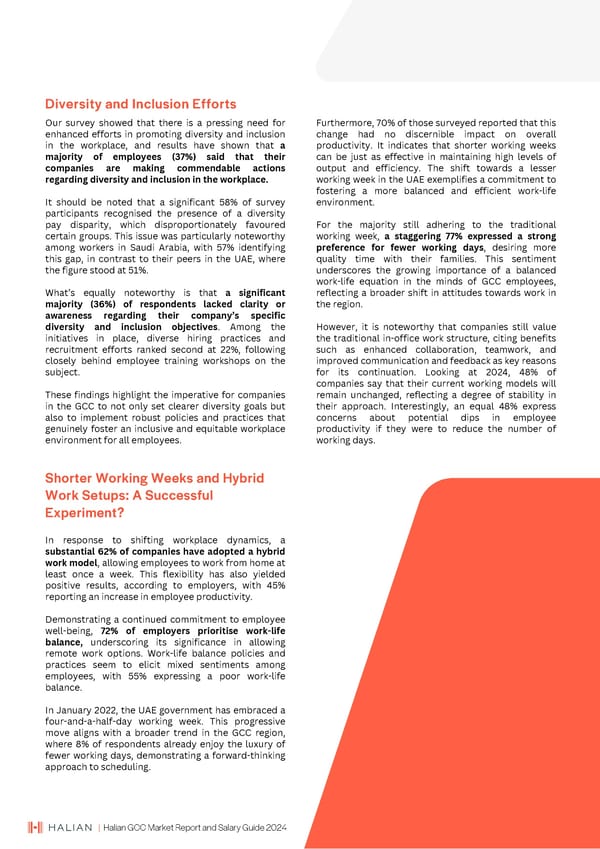Diversity and Inclusion Efforts Our survey showed that there is a pressing need for Furthermore, 70% of those surveyed reported that this enhanced efforts in promoting diversity and inclusion change had no discernible impact on overall in the workplace, and results have shown that a productivity. It indicates that shorter working weeks majority of employees (37%) said that their can be just as effective in maintaining high levels of companies are making commendable actions output and efficiency. The shift towards a lesser regarding diversity and inclusion in the workplace. working week in the UAE exemplifies a commitment to fostering a more balanced and efficient work-life It should be noted that a significant 58% of survey environment. participants recognised the presence of a diversity pay disparity, which disproportionately favoured For the majority still adhering to the traditional certain groups. This issue was particularly noteworthy working week, a staggering 77% expressed a strong among workers in Saudi Arabia, with 57% identifying preference for fewer working days, desiring more this gap, in contrast to their peers in the UAE, where quality time with their families. This sentiment the figure stood at 51%. underscores the growing importance of a balanced work-life equation in the minds of GCC employees, What’s equally noteworthy is that a significant reflecting a broader shift in attitudes towards work in majority (36%) of respondents lacked clarity or the region. awareness regarding their company’s specific diversity and inclusion objectives. Among the However, it is noteworthy that companies still value initiatives in place, diverse hiring practices and the traditional in-office work structure, citing benefits recruitment efforts ranked second at 22%, following such as enhanced collaboration, teamwork, and closely behind employee training workshops on the improved communication and feedback as key reasons subject. for its continuation. Looking at 2024, 48% of companies say that their current working models will These findings highlight the imperative for companies remain unchanged, reflecting a degree of stability in in the GCC to not only set clearer diversity goals but their approach. Interestingly, an equal 48% express also to implement robust policies and practices that concerns about potential dips in employee genuinely foster an inclusive and equitable workplace productivity if they were to reduce the number of environment for all employees. working days. Shorter Working Weeks and Hybrid Work Setups: A Successful Experiment? In response to shifting workplace dynamics, a substantial 62% of companies have adopted a hybrid work model, allowing employees to work from home at least once a week. This flexibility has also yielded positive results, according to employers, with 45% reporting an increase in employee productivity. Demonstrating a continued commitment to employee well-being, 72% of employers prioritise work-life balance, underscoring its significance in allowing remote work options. Work-life balance policies and practices seem to elicit mixed sentiments among employees, with 55% expressing a poor work-life balance. In January 2022, the UAE government has embraced a four-and-a-half-day working week. This progressive move aligns with a broader trend in the GCC region, where 8% of respondents already enjoy the luxury of fewer working days, demonstrating a forward-thinking approach to scheduling. | Halian GCC Market Report and Salary Guide 2024
 2024 | Halian GCC Market Report and Salary Guide Page 6 Page 8
2024 | Halian GCC Market Report and Salary Guide Page 6 Page 8